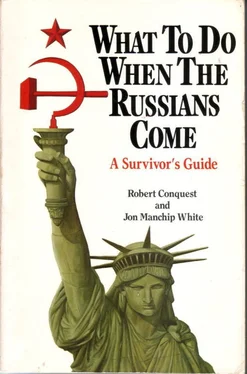Robert Conquest - What to Do When the Russians Come
Здесь есть возможность читать онлайн «Robert Conquest - What to Do When the Russians Come» весь текст электронной книги совершенно бесплатно (целиком полную версию без сокращений). В некоторых случаях можно слушать аудио, скачать через торрент в формате fb2 и присутствует краткое содержание. Город: New York, Год выпуска: 1984, ISBN: 1984, Издательство: Stein and Day Inc., Жанр: Публицистика, на английском языке. Описание произведения, (предисловие) а так же отзывы посетителей доступны на портале библиотеки ЛибКат.
- Название:What to Do When the Russians Come
- Автор:
- Издательство:Stein and Day Inc.
- Жанр:
- Год:1984
- Город:New York
- ISBN:0-8128-2985-9
- Рейтинг книги:3 / 5. Голосов: 1
-
Избранное:Добавить в избранное
- Отзывы:
-
Ваша оценка:
- 60
- 1
- 2
- 3
- 4
- 5
What to Do When the Russians Come: краткое содержание, описание и аннотация
Предлагаем к чтению аннотацию, описание, краткое содержание или предисловие (зависит от того, что написал сам автор книги «What to Do When the Russians Come»). Если вы не нашли необходимую информацию о книге — напишите в комментариях, мы постараемся отыскать её.
What to Do When the Russians Come — читать онлайн бесплатно полную книгу (весь текст) целиком
Ниже представлен текст книги, разбитый по страницам. Система сохранения места последней прочитанной страницы, позволяет с удобством читать онлайн бесплатно книгу «What to Do When the Russians Come», без необходимости каждый раз заново искать на чём Вы остановились. Поставьте закладку, и сможете в любой момент перейти на страницу, на которой закончили чтение.
Интервал:
Закладка:
But with all the casualties your generation will suffer, millions upon millions of you will survive. And on record, the Communists have never succeeded—in spite of appearances to the contrary—in carrying out their program of fully indoctrinating the young. You should remember that the vast majority of your age group, not only in America but throughout the Soviet world, is at heart disaffected. However much, over the years, your immediate needs take precedence, this core of your personality will remain. And you have one great point in your favor: unlike your parents, you may find that the overthrow of Soviet power will come when you are still in the full vigor of, perhaps, your forties, when you will provide the leaders to build a new America and a new world.

6. THE QUALITY OF LIFE
YOU WILL FIND the altered climate of your life hard to adjust to. The first physical and psychological effects of the defeat, however it comes about, will be very terrible and will last months, perhaps years. You will have been shocked into a state of numbness that will rob many people of the will to live, against which you will have to struggle or succumb.
Then, as the Occupation tightens its grip, you will have to accustom yourself to the prospect of living a life that will be totally politicized. In all Communist countries, politics is an obsession, the central core of all thought and activity. You will find that your life is heavily bound up with questions of your own orthodoxy; with matters of heresy, schism, blasphemy, and back-sliding, and of the orthodoxy of the people around you. Not only will you be required to attend lectures on Marxism-Leninism at your place of work, but the newspapers you read, the television you watch, the radio you listen to, even the very streets around you will be filled with Communist slogans and exhortations. You will not be able to attend a football game or walk through a park without being subjected to propaganda speeches from massed loudspeakers. One particular irritation will be the visits of delegations from any still democratic countries, consisting of Communist sympathizers whose fulsome praise for the new order and the happiness of the Americans living under it will be sure to turn your stomach. Such things you will find maddening, but you must accustom yourself to them and put up with them, for to appear bored or hostile will be dangerous. After a time you will find that you hardly notice.
Outside your own home, perhaps even outside your own room in your own home, you feel yourself continuously subject to examination and scrutiny. It will be like living in a fishbowl. Or, to change the metaphor, you will feel as if you had been stripped of your clothes and are walking naked or as if the regime has performed a delicate operation on you that has peeled off the outer layer of your skin. As the Russian writer Isaac Babel remarked, under Soviet communism at its worst, “One only talks freely with one’s wife—at night, with the blankets pulled over one’s head.”
You will find yourself forced to separate your life outdoors from your life indoors, your public life from your private one. You will begin to practice the compartmentalized existence practiced by all people who survive under a Communist dictatorship. You will split your mind into two halves. It is a trick that it will take you some time to acquire; but unless you belong to the minority, tiny and nasty, who will throw in their lot with the Communists, you will eventually learn how to demarcate your activities into a public sphere and an increasingly constricted private sphere. And you must get used to the fact that you will have to do or say something you will hate yourself for at least two or three times a day.
You will do all the things required of you: attend the meetings, march in the parades, chant the slogans, cheer the leaders.
You will at the same time perform an inner withdrawal and cultivate a very intense private life. This is where you must live—inside yourself or within a small circle—and it is a life that will become increasingly precious to you.
You will become gratified at the depth and closeness of your family relationships and your immediate friendships. These profound affections are the compensation, well known in all Communist countries, for the otherwise monotonous and mechanical quality of your existence. You will also find that, beneath the brusqueness and suspicion with which you will treat strangers and outsiders; beneath the endemic bad temper, snarling, and rudeness, there will sometimes spring up a remarkable spirit of kindness and generosity. Deprivation, fear, short rations, endless waiting lines, and the need to be servile will make everyone touchy and quarrelsome. Suspicion will arise between honest men. And yet, people who are companions in misery in their submission to a Communist government, even in Russia itself, are often prompted to behave toward each other with a rare selflessness and compassion.
However, take care not to be too carried away by the warmth of your friendships and family feeling. You will not really be safe even in the bosom of your own family. A specific and very great danger will arise when, after the regime is fully established, your children will have to join the “Pioneers” and will thus become integrated into the Communist system. In addition to providing some military training and running the summer camps, the Pioneers will inculcate the lesson that loyalty to Communism is far more praiseworthy than loyalty to one’s family. As we have said, if you have subversive ideas, you must be very careful not to express them directly in front of your younger children. Even the most loyal child may inadvertently blurt things out and get you into trouble. Some children become brainwashed by the constant propaganda to which they are exposed and become zealous agents of the regime. Such unfortunate girls and boys are singled out and cherished by the Communists. Pavlik Morozov, a boy who during the collectivization of the land in the Soviet Union denounced his parents for hoarding and had them shot, is still lauded as a hero in the USSR and new statues to him have recently been erected. Most parents will try to pass on to their children, as we remarked earlier, decent values, and the general experience from Communist countries is that many succeed. However, you must proceed with the utmost vigilance, especially when your children are at an impressionable and talkative age. Therefore, as you peer out across the ruins, your first duty to yourself and to your loved ones is to practice caution. Every day you will be walking through a minefield. Every caretaker, doorman, porter, elevator man, lavatory attendant, and taxi driver is a potential government informer, not to mention the people with whom you regularly rub shoulders at the office or factory. You will have to consider very carefully the weaknesses of your old friends and acquaintances. And you must never make new friends impulsively or trust first impressions. Enlarge your circle slowly and carefully. You will learn to identify the people who are sympathetic to you and your ideas by subtle signs: a slight smile here, a cautious nod there. Even then you will be very careful. It is true that there may only be one rotten apple in the barrel; but you will not know which it is.
By the way, on the subject of communication, the telephone system will deteriorate rapidly, and you will no longer be able to rely on it to get through on any given day. However, we would advise you to keep your telephone if you can. A friend may be able to give you useful information that is otherwise unobtainable, for example, the appearance of lemons at some market. But do not speak indiscreetly. The chances of being bugged will be very small, especially at first; but as with all your actions, better safe than sorry should be your guiding principle. Similarly, you will not put on paper, in letters in particular, any facts or thoughts that might give offense to the authorities or annoy any individual official.
Читать дальшеИнтервал:
Закладка:
Похожие книги на «What to Do When the Russians Come»
Представляем Вашему вниманию похожие книги на «What to Do When the Russians Come» списком для выбора. Мы отобрали схожую по названию и смыслу литературу в надежде предоставить читателям больше вариантов отыскать новые, интересные, ещё непрочитанные произведения.
Обсуждение, отзывы о книге «What to Do When the Russians Come» и просто собственные мнения читателей. Оставьте ваши комментарии, напишите, что Вы думаете о произведении, его смысле или главных героях. Укажите что конкретно понравилось, а что нет, и почему Вы так считаете.












